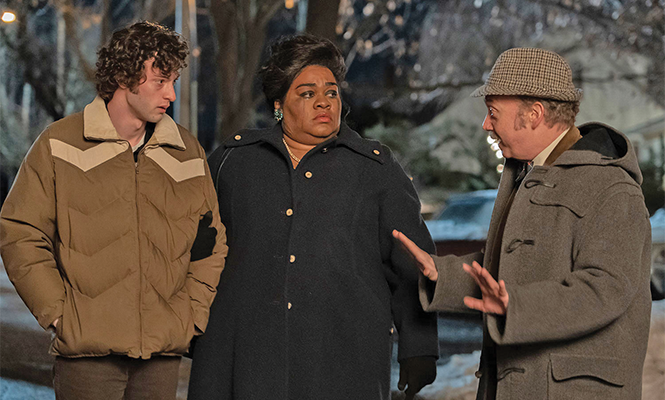Feature film review: The Holdovers
Evoking the New Hollywood cinema of the 1970s, but in a feel-good version
By Scott Renshaw @scottrenshawAs Alexander Payne's The Holdovers opens, the very first thing we see is a throwback "blue screen" MPAA rating card, the kind that accompanied the films of 50 years ago. From there we get an even more pointed gag, with the creation of a retro-styled logo for distributor Focus Features (one that never actually existed, given the company's history going back only to the early part of this century). It even creeps into the opening credits—not just in the way everyone from the cast members to the hairstylists are included, but to the Roman numeral copyright date being indicated as "MCMLXXI" (1971, for the non-Romans among us). It's one thing to set a story in the early 1970s, as Payne and screenwriter/TV veteran David Hemingson do here; what they really want, though, is to make it clear that this story is of the early 1970s.
And that's why it's a bit of a bummer that The Holdovers is so, well, nice. It's not that there weren't nice movies in the early 1970s, as the remnants of the old studio models bumped up against the auteurs of New Hollywood, but that this movie seems to want to evoke the former much more than the latter. Everything here seems set up for a tale with as much grit and grain as we see in the film stock, until all the roughest edges wind up sanded down.
The setup feels primed for a particularly caustic sensibility, as the holidays approach at a New England boarding school Barton Prep circa 1970. One faculty member is required to serve as chaperone for any students unable to head home for the winter break, and that task falls to Paul Hunham (Paul Giamatti), a misanthropic ancient civilizations instructor. While several students initially are in his charge, the group is ultimately winnowed down to 17-year-old Angus Tully (Dominic Sessa), a troubled kid seemingly down to his last strike after getting kicked out of several other schools, and perhaps genetically engineered to test Paul's patience.
Also remaining at Barton is the school's head cook, Mary (Da'Vine Joy Randolph), still grieving the death of her son in Vietnam earlier that same year, and part of what initially feels like an interesting look at privilege in America. As a Black scholarship kid who couldn't afford the college that would have allowed him a draft deferment, Mary's son represents the counterpoint to Barton's many entitled scions of wealth. Giamatti's character plays into this notion as well, as he is placed in the role of babysitter in part as punishment for flunking the son of an angered wealthy donor, and his own backstory gradually reveals plenty of cause for feeling embittered about who gets the benefit of the doubt in our society, and who doesn't.
The problem is that Paul Hunham is ultimately kind of a weirdly constructed character. Hemingson's script piles on several off-putting physical characteristics—a lazy eye, body odor, excessive sweatiness—that would make him something of a social outcast regardless of his class status, so the idea that his fate is exclusively a function of economics falls flat. And while this type of role as a guy with contempt for those who don't have appreciation for excellence is firmly in Giamatti's wheelhouse, just like his role in Payne's Sideways, it's unexpected to see his growing friendship with Angus softening up the concept's skewering of spoiled brats. What do we make of something that flips on a dime from "eat the rich" to "nepo babies have feelings, too?"
The thing is, The Holdovers winds up being fairly good at the kind of movie it turns into, which is basically an "inspirational teacher" movie crossed with an odd-couple buddy comedy. The cast is uniformly solid, with Sessa a charming discovery and Randolph nailing a nuanced portrayal of dealing with grief. The entertainment value is there; what's missing is the kind of roiling confrontation with a changing world that characterized the best movies from the era The Holdovers attempts to evoke. Payne, Hemingson and company want the audience to feel good at the end of their movie, and that mission is accomplished. They just aren't representing a time when what filmmakers wanted audiences to feel at the end of their movie was at least a little bit angry.
More by Scott Renshaw
-
Film Reviews: New Releases for April 26
Challengers, Boy Kills World, Humane, Alien 45th anniversary
- Apr 25, 2024
-
CHALLENGERS feature movie review
Zendaya centers a romantic triangle with a unique relationship spin
- Apr 24, 2024
-
Film Reviews: New Releases for April 19
The Ministry of Ungentlemanly Warfare, Abigail, The Beast, Hard Miles, Sasquatch Sunset and more
- Apr 19, 2024
- More »




